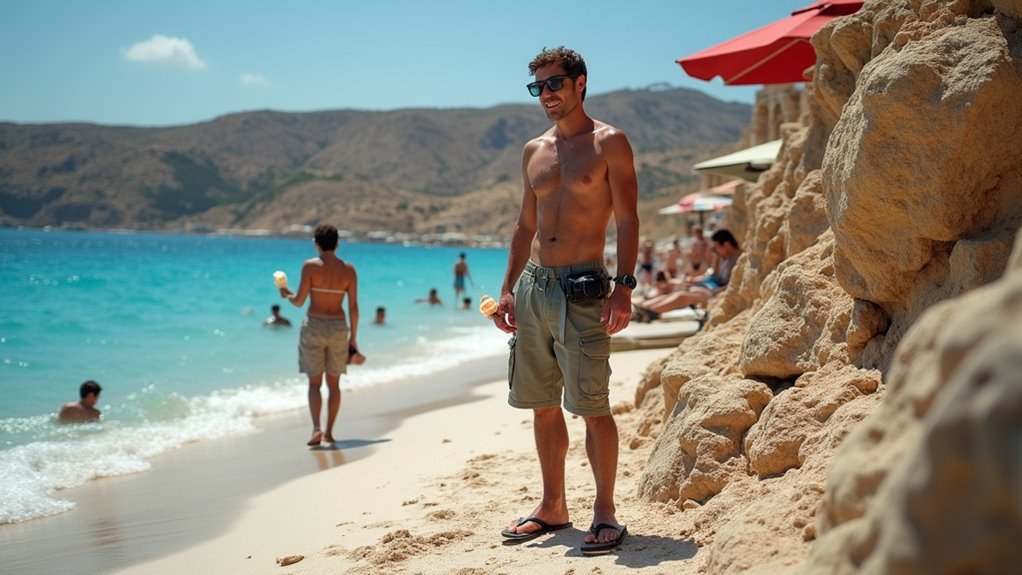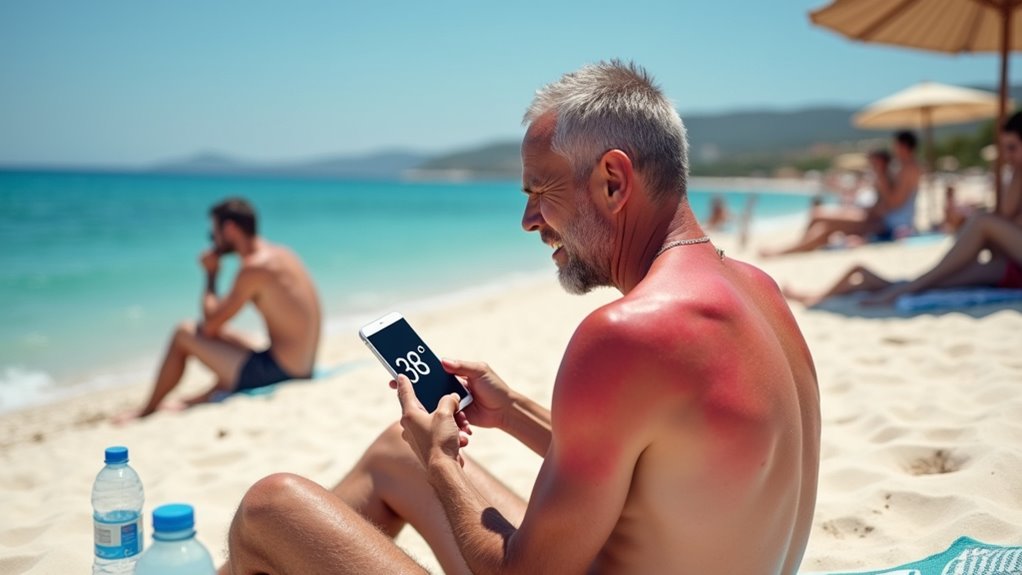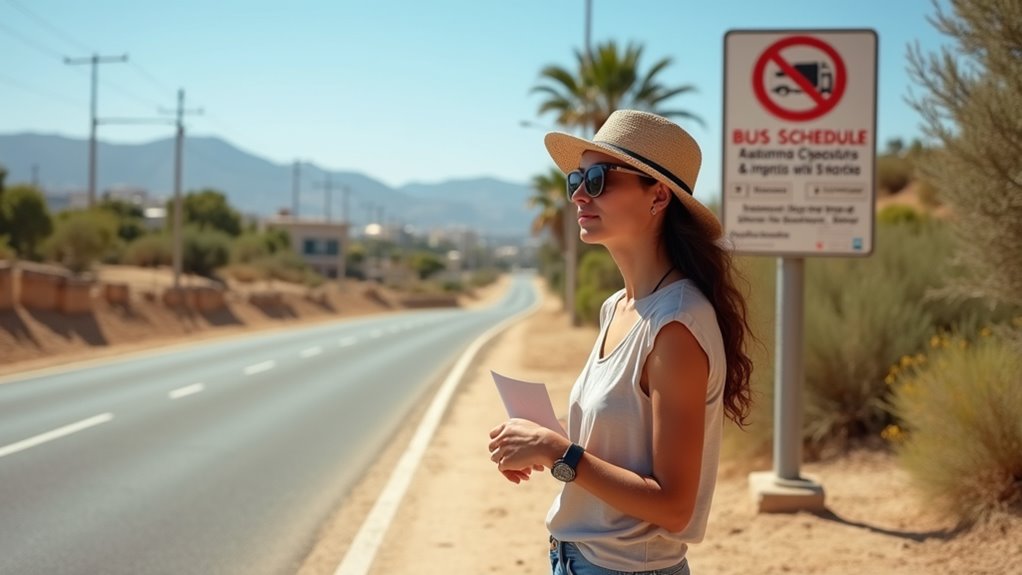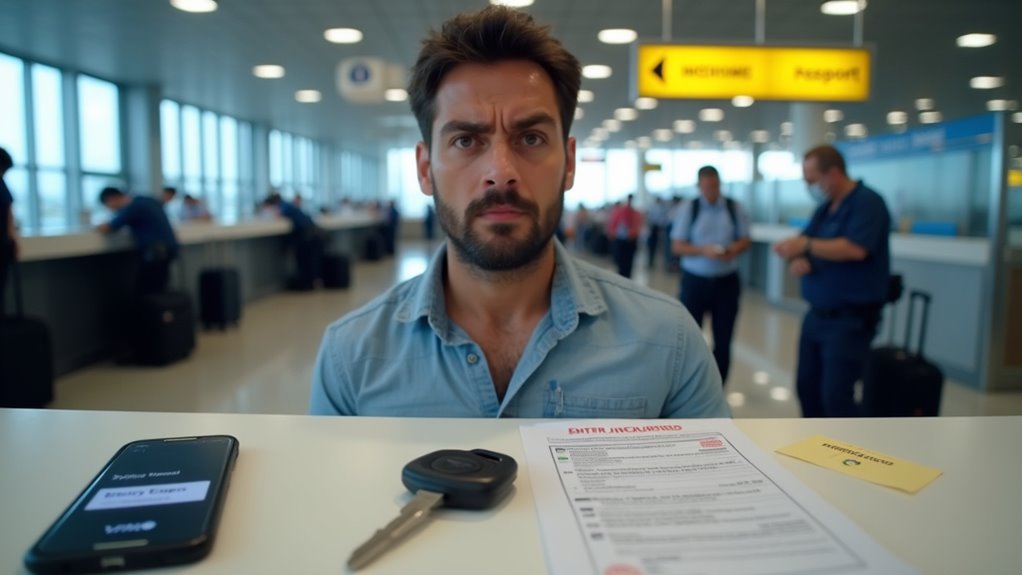Physical Address
304 North Cardinal St.
Dorchester Center, MA 02124
Physical Address
304 North Cardinal St.
Dorchester Center, MA 02124

Foolish mistakes in Cyprus can ruin your Mediterranean getaway—discover the crucial pitfalls savvy travelers never make.
When visiting Cyprus, avoid these critical mistakes: neglecting sun protection in the intense heat, disrespecting local customs like refusing offered food, rushing through traditional meals, leaving valuables unattended at beaches, relying solely on limited public transportation, booking accommodations without proper research, and traveling without extensive insurance and documentation. These missteps can quickly transform your Mediterranean dream vacation into a stressful experience. The following detailed insights will help you navigate Cyprus like a seasoned traveler.

While Cyprus offers stunning Mediterranean landscapes and opulent cultural experiences, its intense sunshine presents a serious health hazard for unprepared visitors. With UV indices regularly hitting 8-10 and up to 340 sunny days yearly, your skin faces constant threat.
Don’t venture out without broad-spectrum SPF 30+ sunscreen applied 30 minutes before exposure and reapplied every two hours. Wear UPF 50+ clothing, wide-brimmed hats, and quality sunglasses. Cyprus’s thriving sun protection market is expected to reach US$947.18k revenue in 2025, reflecting the critical need for these products.
Avoid outdoor activities between 11:00-16:00 when radiation peaks.
Stay hydrated by drinking at least 3L of water daily, especially during summer months. Unlike snorkeling in Dubrovnik, Cyprus beaches offer less shade and higher temperatures, making hydration even more crucial. Monitor your urine color and recognize heatstroke symptoms: confusion, rapid pulse, and hot skin.
Keep emergency numbers (112/199) accessible and seek immediate medical attention if you experience severe heat-related symptoms.
Beyond physical preparations for Cyprus’s climate, your cultural awareness will substantially impact your experience on this diverse Mediterranean island. Cypriots value hospitality, respect for elders, and traditional customs. Failing to acknowledge these norms can unintentionally offend locals and diminish your experience.
Remember these essential cultural guidelines:
Cultural awareness is your passport to authentic Cypriot experiences—respect their customs to truly connect with the island’s heart.
Cyprus is definitely worth visiting for its blend of Mediterranean hospitality and rich cultural traditions, but respecting local customs will make your experience more authentic and welcomed.

Unlike many Western dining experiences, Cypriot meals unfold as unhurried social rituals that shouldn’t be rushed. Traditional meze isn’t simply appetizers but a complete meal featuring 15-30 dishes served progressively over hours.
When dining in Cyprus, don’t expect quick bill service or rapid table turnover. Staff won’t automatically bring your check; you’ll need to request it specifically. The meal typically concludes with complimentary fruit or dessert, further extending your dining experience. This leisurely pace is common across European food culture, where meals are seen as opportunities for connection rather than mere sustenance.
Many Cypriot specialties require significant preparation time—koupepia (stuffed vine leaves), slow-roasted souvla meats, and wine-marinated octopus demand patience. Particularly notable are authentic athoi which are stuffed zucchini flowers harvested at dawn for maximum freshness. Fast food culture clashes with local expectations, where conversation and communal eating take precedence.
Remember that leaving immediately after eating can appear dismissive. Chefs often visit tables for feedback, and lingering for conversation is considered proper appreciation of Cypriot hospitality.
Beach relaxation demands a different kind of vigilance than your leisurely Cypriot meals. With 57 theft cases reported across Cyprus beaches in just three months, particularly at Finikoudes Beach in Larnaca, your unattended belongings become prime targets for opportunistic thieves. Recently, a 44-year-old man was arrested for systematic thefts from beachgoers after being found with stolen phones and sunglasses.
Much like how wine preservation requires careful attention to protect its quality, your valuables at the beach need similar protection from theft and damage.
To protect your valuables:

Travelers who gamble their Cyprus exploration exclusively on public transportation often find themselves stranded when buses fail to materialize or service hours abruptly end.
While services in cities like Larnaca score well (9.32/10), rural areas suffer from significant frequency gaps and unpredictable delays.
You’ll face particular challenges after dark, with no 24/7 routes available and reduced weekend schedules in smaller towns.
The system’s limitations become painfully apparent during holidays, peak tourist seasons, and cultural events when services may change without notice.
With only 59.7% user penetration forecasted for 2025, many visitors will encounter coverage gaps in less populated areas.
Most concerning is the lack of real-time tracking and no unified payment system across regions.
Similar to Split’s transportation options, Cyprus requires careful planning to avoid overspending on last-minute alternatives.
Always have contingency options—download taxi apps, rent a car for rural exploration, or arrange private transfers for critical journeys.
The modest investment in backup transportation prevents your carefully planned itinerary from derailing.
When searching for Cyprus accommodations, many visitors fall victim to glossy online photos and deceptive descriptions that mask the reality of their chosen lodging. Holiday scams are increasing, especially during peak seasons, with fraudsters operating fake listings across multiple platforms. Unlike luxury destinations in other parts of Europe, Cyprus has a particular problem with misrepresented accommodations that don’t deliver the promised amenities.
To avoid becoming a victim:
The consequences of skipping due diligence are severe—financial loss, ruined holidays, and limited legal recourse. With over 12,000 short-term rentals in Cyprus, many unregistered, thorough research is your best protection. Travelers should be particularly vigilant in August, as this month sees peak booking activity and correspondingly higher rates of holiday fraud.

Arriving in Cyprus without proper documentation and inadequate insurance coverage can transform your dream Mediterranean vacation into a bureaucratic nightmare. Confirm your passport is valid for at least six months beyond your departure date and contains two blank pages for stamps.
Research visa requirements for your nationality, as some travelers need to apply in advance. If you’re visiting both the Republic of Cyprus and Northern Cyprus, understand the complex entry regulations between these politically divided regions. Remember that US citizens can stay for up to 90 days without a visa, but other nationalities may have different requirements.
Don’t underestimate insurance needs – standard policies often exclude adventure activities and cap electronics coverage below replacement costs. Medical emergencies without proper insurance can lead to significant upfront hospital payments and potentially devastating evacuation costs.
For prescribed medications, especially controlled substances, carry notarized documentation to avoid customs issues. Unlike nearby Malta as alternative, Cyprus has stricter regulations regarding entry requirements that must be thoroughly researched before your trip.
While Cyprus welcomes you with ancient ruins and crystal waters, it demands your respect for its customs and climate. You’ll need patience at tavernas yet vigilance at beaches; detailed insurance yet spontaneous travel plans. Research accommodations thoroughly before booking, but leave room for unexpected discoveries. Remember, the Mediterranean sun that bronzes your skin can also burn it mercilessly. Pack both your documentation and an appreciation for the island’s unique pace—they’re equally essential.